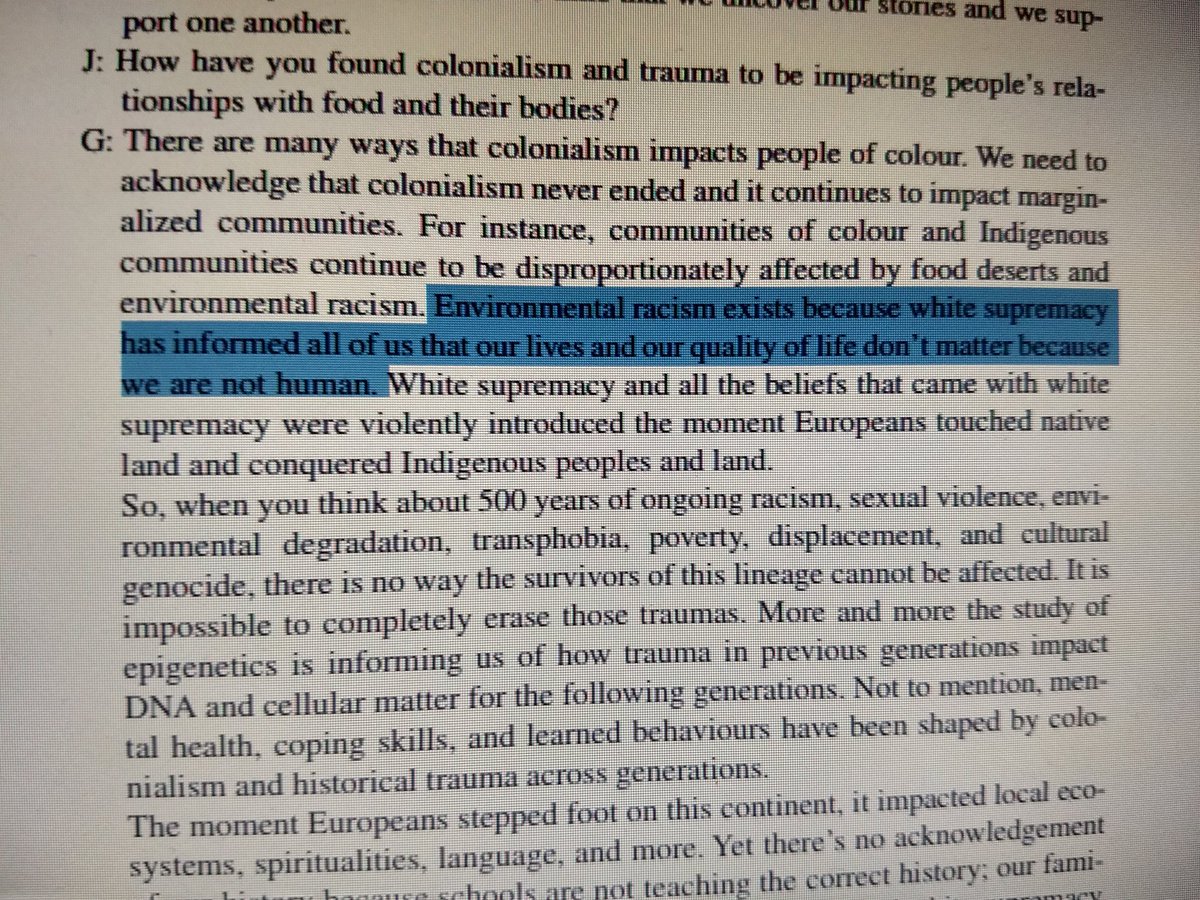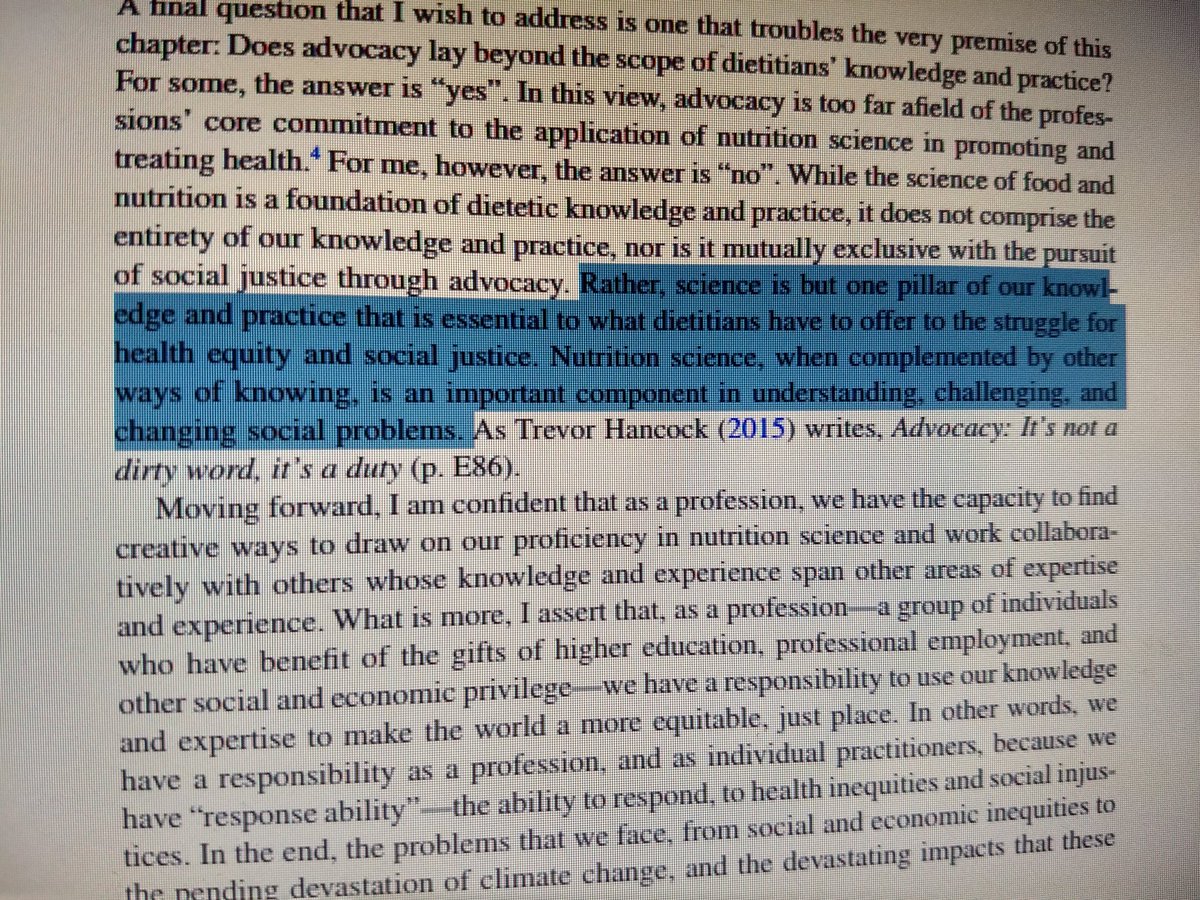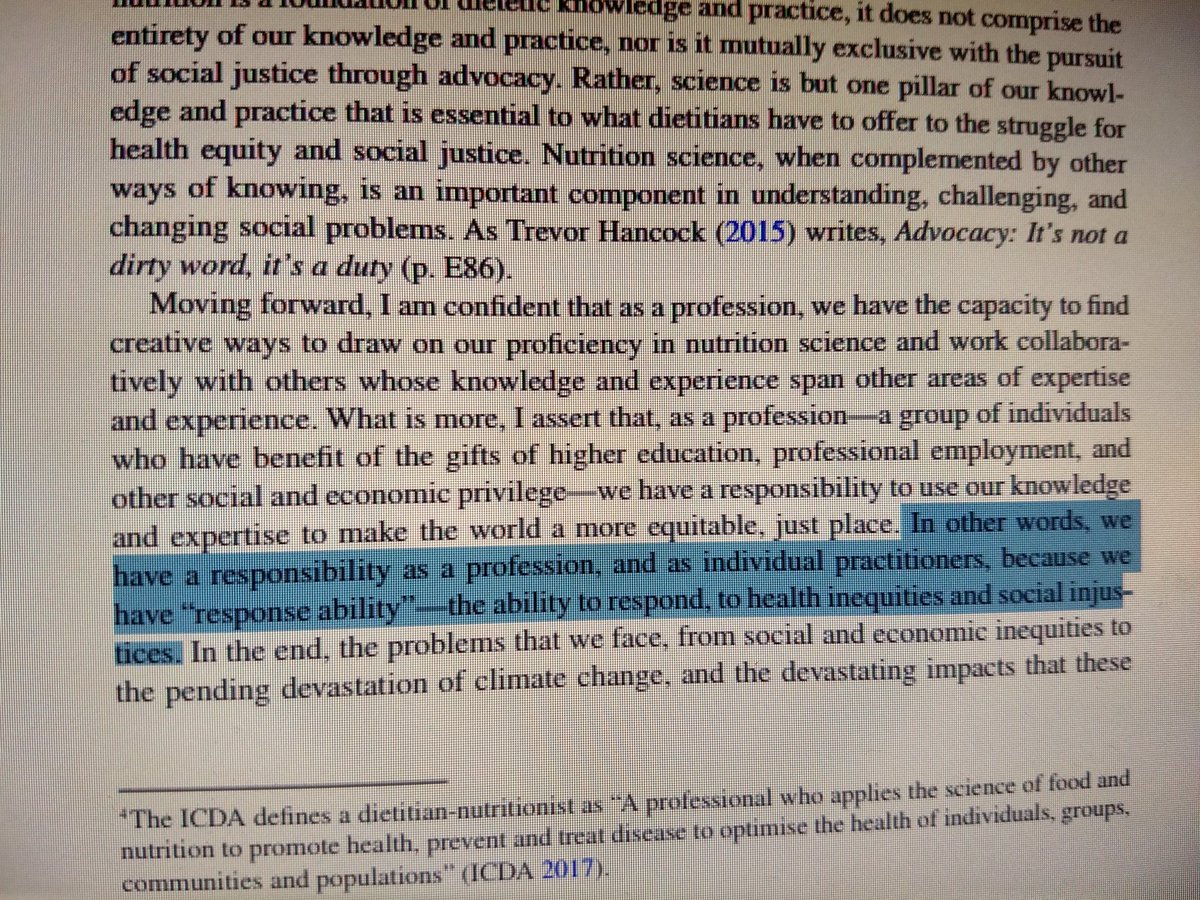I have been asked to read and review a book on "Critical Dietetics" (Social Justice for dieticians), and it's literally the stupidest thing I've ever read.
I'm back into this "critical dietetics" nonsense, and it's not getting better.
"Prior to the eighteenth century, women were held in high esteem as healers through the use of herbs, spices and other foods in the use of medicinal cookery."
Yes, go back to a pre-medical approach...
"Prior to the eighteenth century, women were held in high esteem as healers through the use of herbs, spices and other foods in the use of medicinal cookery."
Yes, go back to a pre-medical approach...
Two of the four main goals for this chapter:
"-Understand how the hierarchy of practice and what we count as evidence has influenced the way in which power has shifted within the dietetic profession.
-Understand how dietitians are socialized into the profession."
Of course.
"-Understand how the hierarchy of practice and what we count as evidence has influenced the way in which power has shifted within the dietetic profession.
-Understand how dietitians are socialized into the profession."
Of course.
So this chapter's primary aims include undermining the use of rigorous evidence in place of stories and lore and to articulate how professionals are "socialized" into not being snake-oil peddlers, gurus, and mystics. Awesome.
https://twitter.com/ConceptualJames/status/1117837749560709120
This is described as the "issue of power": "In our lived world of hierarchical power relations, some people win, some people lose, some people speak and are heard, others speak but no one hears; some knowledge is valid other knowledge is not."
This is a big point. (next tweet)
This is a big point. (next tweet)
I think I messed up the threading.
https://twitter.com/ConceptualJames/status/1117847138669613056?s=19
Here, critical dietetics tries to turn medical expertise into a power dynamic and to position bullshit artists as victims of that dynamic, who thus deserve special treatment. This is a perfect window into how grievance studies thinks. 

Another grievance studies standby: they're told their "critical" bullshit is irrelevant and falls outside of the scope of the discipline, and they interpret this as conspiratorial gatekeeping to preserve a political status quo (say, instead of professional standards). 

"The word “critical” often evokes a feeling of discomfort...we need to alleviate these concerns and present Critical Dietetics as a movement that values other forms of knowledge and research methods (beyond the technical, rational approach and the reliance on the clinical trial)"
I often get asked if I have examples of grievance studies saying that we need to move directly away from rigorous methods that are known to work. Here you go.
https://twitter.com/ConceptualJames/status/1117856537660280833
"One of the key elements of professional practice in healthcare today is the concept of evidence-based practice. ... It is time to bring back the artistry of practice that was lost in the movement away from Home Economics to dietetic programmes focussed on nutritional science."
I forgot to mention the central ironic hilarity of this book: it's advocating that dietetics move away from science and toward *Home Economics*. Of course, using revisionist methods, Home Ec isn't interpreted as a patriarchal attempt to keep women in the home, but I digress.
The next chapter should be good. A key goal: "Articulate the elements of the safe space concept, and recognize how the learning environment can influence inclusion, relational work, the diversity of conversation and the cocreation of more complete knowledge and learning."
"Without a background and learned appreciation of multidisciplinary and trans-theoretical approaches, nutritional practices cannot be far-reaching and sustainable."
That clears things up completely. Sentences like this will save the world.
That clears things up completely. Sentences like this will save the world.
"This chapter provides a unique perspective on how to cocreate knowledge in the classroom by challenging traditional hierarchical education models."
Of fucking course it does. They ALWAYS go after remaking education (after being deemed incompetent and irrelevant by real experts)
Of fucking course it does. They ALWAYS go after remaking education (after being deemed incompetent and irrelevant by real experts)
"By facilitating a space for exposing authenticity and vulnerability, students may be better equipped..."
Again and again I point out that the way this cult, like all cults, operate is by manufacturing and manipulating vulnerability. SocJus is bad for it.
areomagazine.com/2018/12/18/pos…
Again and again I point out that the way this cult, like all cults, operate is by manufacturing and manipulating vulnerability. SocJus is bad for it.
areomagazine.com/2018/12/18/pos…
The fourth chapter of this critical dietetics book is an insane asylum in print. Here, educators must learn why "dialogue is problematic." 

For what it's worth, I'm in the fourth chapter of this book about "critical dietetics," and not a single dietetic or nutritional concept has appeared yet.
In the ideal "critically" informed dietetics classroom:
"The politics of knowledge and whose knowledge "counts" and why would be examined. In dietetics the three traditional roles for RDs; clinical, community/population health and food service/management would be problematized."
"The politics of knowledge and whose knowledge "counts" and why would be examined. In dietetics the three traditional roles for RDs; clinical, community/population health and food service/management would be problematized."
Among other wonders, this is a fascinating definition of "ideology." Grievance studies tries to insist that being *who you happen to be* is ideological. 

Chapter 5 ain't looking promising, but I have to tap out on this for the day and engage with something, anything, real. 

Chapter 5 starts off by announcing that "biological needs" are only one consideration of nutritional care. Alongside (and above) these, it places power relations that need to be disrupted. This chapter's likely to be a doozy.
I have to report that despite the initial concerns I had and noting the overarching belief that power must be disrupted, Chapter 5 is the most sober, sane, and responsible "critical" essay I've ever read. It's a decent example of the kinds of questions good work should ask.
Chapter 6 is about "Food Democracy" and could have been written by libertarians who care about the environment and sustainability instead of SJWs. Interesting. I'm not sure if this will get crazy yet or not.
It seems only to be a bit nuts in saying that critical dietetics should fight "nutritionism" and is a bit conspiratorial against Big Food. Maybe some of this is okay, but it neglects the benefits of "Big Food" at feeding people on large scales and is a bit bourgeois.
So, other than the weird claim that dietetics should abandon the idea that nutrition is of key importance and focus on political aims like sustainability and locality, Chapter 6 isn't too nutty, but it's likely to be impractical for genuine implementation. That's not surprising.
Chapter 7 seems to continue this line of argumentation, which creates an insistence that dieticians have an obligation to incorporate sustainability and ecological (political) concerns (among others only briefly mentioned) into their practice. That's not clear, but maybe.
At any rate, Chapters 5-7 are (so far) not totally crazy, which is nice to see in a book like this. Chapter 2 is a trainwreck, though, and I stand by my assessment that the first section of Chapter 4 is an insane asylum in print (it's about safe spaces in dietetics education).
Here's a window into what I mean. This isn't prima facie crazy, but the idea that dieticians need to make it a priority seems underevidenced. In fact, it's just asserted. It's not clear political agendas will improve the clinical practice of working dieticians. 

Chapter 8 was a dull explanation of the complexity of ethics and how to prioritize means of selecting foods. It's down on "so-called" science and looks toward blurring categories to forward "cultural" knowledges as of key relevance to dietetics. It's against "scientism." 

Chapter 9 starts, after some anti-capitalist manipulation, by quoting Lenin. In a book on food politics. This is going to be full-on.




@newbury_eric I don't really understand the difficulty. The profit model is essentially cost of goods and services plus a reasonable reward for risk and ingenuity.
"A profit system cannot exist without exploitation; it is the source of profit," it says not long after.
Hoo, boy! I think the author of Ch 9 (each has different authors) is going to go full (Lenin-style) Marxism instead of the expected grievance studies, but we shall see.
Hoo, boy! I think the author of Ch 9 (each has different authors) is going to go full (Lenin-style) Marxism instead of the expected grievance studies, but we shall see.
After a striking page crapping all over capitalism in the food industry, we turn to this pithy contribution, which happens to be dead wrong. 

After yet another break (I need to take my Leninism in small bites), I've returned to Chapter 9, which is nothing short of an angry anti-capitalist, anti-imperialist (read: US) screed. It's difficult to fathom what this material is doing in a book about dietetics.
We finally get to food. A section here details how the emergence of fast food in developing nations (apparently single-handedly) contributed to the utter collapse of the qualities of diets, then praises traditional diets upon which it just stated they were undernourished.
Now there's a section about the Flint water disaster that doesn't go along with anything else in the entire chapter or book. It's just thrown in there as alleged proof of "environmental racism." It presents no argument for this claim. It's just to be accepted as such.
These people, who ostensibly hate Trump like the Antichrist, provide only *this* argument for "environmental racism" in Flint's water supply: "Many believed that race and social class were the main reasons why the local and state governments’ response were extremely slow."
This chapter is so blatantly anti-globalist that if you took out the references to giving a shit about the environment and racial minorities, it would be easy to pass off as having been written by hardcore Trumpers. The far left and far right are so, so similar.
Remember, this is a book for dieticians. It's utterly unclear why this chapter is here. Luckily every chapter ends with an explanation for its inclusion. Stay tuned.
https://twitter.com/ConceptualJames/status/1118263278185144327
The chapter rounds out by citing the Communist Manifesto. This is a book about dietetics.
Okay, it's time to get back to Critical Dietetics. I now turn to Chapter 10: "Social Justice, Health Equity, and Advocacy: What Are Our Roles?" This should be interesting.
And if you want my opinion, your roles are to stop this nonsense at once.
And if you want my opinion, your roles are to stop this nonsense at once.
"The chapter will review literature on social justice, health equity, and health
advocacy..."
The term "health equity" doesn't rest easily with me. Equity means "adjusting shares to make individuals or groups equal." It can include bolstering and constraining shares.
advocacy..."
The term "health equity" doesn't rest easily with me. Equity means "adjusting shares to make individuals or groups equal." It can include bolstering and constraining shares.
"Do dietitians have a role to play in advancing social justice through advocacy and
activism?"
Almost definitely not.
activism?"
Almost definitely not.
This is a grievance studies *standard paragraph.* I'm almost sure it isn't true. It would be a very worthy project for someone to debunk this idea in a succinct, sharable form because many grievance studies projects are built upon this probably dubious foundation. 

This collection of attempts to define (or not really define) social justice needs to be read to be believed. Yes,they really do mean these things, even when they contradict. Notice "equity" and "remedy historical inequalities."




"The lack of definitive definition of social justice may be thought to leave the goals or purpose of social justice advocacy...ill-defined, directionless, or, worse, immobilized. However, the lack of a concrete definition may also be understood as not only necessary but fruitful"
"[W]hat I’ve sort of figured out working as a dietitian is that socially just practice has to be compassion-centred and trauma-informed in order to be justice-enhancing, and if it’s not all three of those, it’s none of those."
Dieticians are experts in trauma now?
Dieticians are experts in trauma now?
This is nuts.
Notice in the part not highlighted that this "awakening" came while she took a women's studies (grievance studies) course.
Notice in the part not highlighted that this "awakening" came while she took a women's studies (grievance studies) course.

Here's some zero-sum thinking: it's either our way or oppression. And this is delivered as an imperative for *dieticians*. 

I see a "power-related disease," and it plainly *is* communicable through grievance studies courses. 

"…asking questions like “when is it okay to advocate and approach things as neoliberal”. The answer is, never! So, to stop trying to tweak things and salvage things that remain neoliberal"
Here's a great example of grievance studies selectively using material it almost certainly isn't qualified to engage with. Epigenetics and "historical trauma" to understand how colonialism contributes to eating disorders in brown people? 

This isn't even close to true, but it's a postcolonial studies standard.
Also, read the next paragraph. DNA and cellular matter?!
Also, read the next paragraph. DNA and cellular matter?!

"500 years of ... transphobia."
What the hell?
What the hell?
Science is just one pillar of knowledge. Dieticians need other ways of knowing, like, judging by the material immediately preceding this, making things up. 

Dieticians should be social and political activists is the last sentence in the book. With that, I'll close this thread and start working on my book review. :)
• • •
Missing some Tweet in this thread? You can try to
force a refresh























